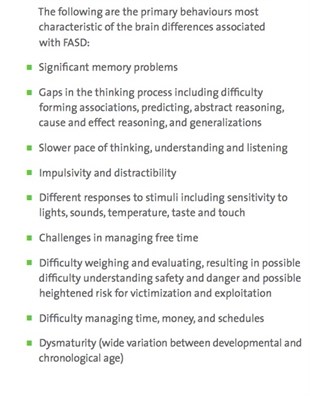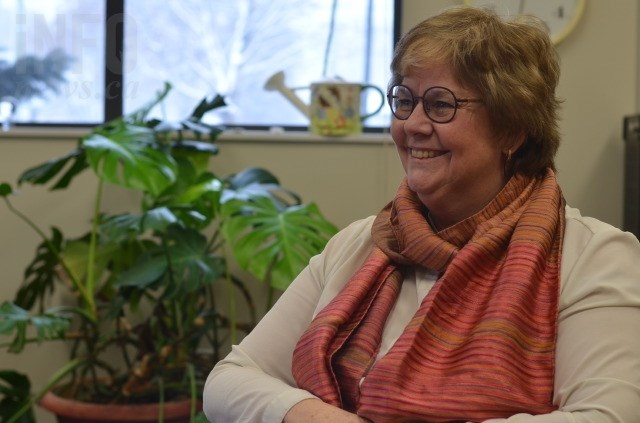
Jay and Iris, who requested that only their first names be used for privacy reasons, hold hands following an interview.
(CHARLOTTE HELSTON / iNFOnews.ca)
January 12, 2018 - 6:30 PM
VERNON - Classic Jay: When he was 10 years old, his teachers noticed him trying the door handles of every car parked on the street as he walked home from school. They phoned his mom to report the concerning behaviour. Turns out, Jay was just being a good samaritan — he wanted to make sure their doors were locked.
The same mental processing disability is what made him rack up thousands of dollars at fast cash loan stores with no appreciation of the consequences of the debt he was getting himself into. It also got him charged with breaking and entering — a misunderstanding that almost cost him a jail sentence.
“Classic Jay,” his mom says.
Jay, 37, has used his experiences to explain to schools, service providers, and even the RCMP what it’s like to live with Fetal Alcohol Spectrum Disorder. But because of a technicality in how FASD diagnoses are made, Jay doesn’t have the disorder — at least not on paper. It’s a challenge many who believe they have the disorder face: even if they show telltale symptoms, assessors frequently rely on an admission from the birth mother that she consumed alcohol while pregnant. Between adoptions and the stigma associated with FASD, those admissions aren’t always readily available.
That leaves people like Jay, and his mom, without a lot of options.
“MY BIGGEST WORRY ABOUT HIM IS HIS VULNERABILITY”
Jay lives on his own in Vernon and earns a meagre paycheque as a newspaper delivery man. He’s on disability, which he uses to pay his rent. He has a roof over his head, has food and a job, but it could all unravel in a second, especially if his mom, Iris, wasn’t in the picture.
“My son is only housed because he had a person in his life who supported him. If that wasn’t the case, he’d be out there with all the rest of them, struggling to survive,” she says. By “them” she means the homeless.
She’s the one who made sure his apartment was exterminated for bed bugs (likely brought in on an old couch) not that long ago. Without her, he probably would have been evicted. Another time, when he and his former girlfriend signed up for credit cards during a trip to the grocery store, she’s the one who bailed him out.
Iris, a social services worker, says Jay isn’t unlike many individuals who slip through the cracks due to disabilities or mental health issues and find themselves on the street. The difference is he has her. For now, at least.
“I’m over 70. I may not be here in 10 years,” she says.
She has a will and has set up the inheritance so Jay will get it gradually. But her son needs much more than money. It’s the day-to-day things, making sure he takes care of himself and doesn’t get taken advantage of, that Iris worries about most.
“My biggest worry is his vulnerability,” she says. “If I died tomorrow, John Howard (shelter) here we come.”

As she ages, Iris worries about what will happen to her son when she's no longer around to support him.
(CHARLOTTE HELSTON / iNFOnews.ca)
NO OFFICIAL DIAGNOSIS
Life has been tough for Jay since day one. Born with a rare metabolic disorder that leaves him unable to consume milk products (most babies with the condition die in the first two weeks if untreated) Jay suffered an undetermined level of brain damage as an infant. His mom, Iris, adopted him when he was four months old and says he was a “beautiful little child.” As he got older, Iris began to notice other oddities: he didn’t sleep (common in those with FASD) and didn’t understand consequences. He had anger issues and trouble socializing with other kids.
“He says his brain is like a computer where you put things in files. When you’re talking to him, he can access the first file, but if you’ve gone on and kept talking, he’s still looking for that first file and can’t find it. Then he just gets mad,” Iris says.
Jay is extremely literal, and it’s hard for him to answer questions that aren’t completely direct (this becomes apparent in a later interview.) He has memory problems, a slower thought process, and difficulty managing time, money and schedules.
Around Grade 7, Jay made friends with a young girl who was also adopted and a light bulb went on for Iris.
“She had been diagnosed FAS and they were exactly the same,” Iris says. “At that time, FAS was so shameful to talk about. I remember talking to the adoptive mom and she was whispering it.”
Jay has been assessed for FASD, but the results are always non-conclusive. Because he doesn’t have any of the common facial features associated with the disorder (thin upper lip, little or no groove between the nose and upper lip, and small eyes) and doesn’t have an admission from his birth mom, assessors can’t definitively say if he has the disorder or not. According to Health Canada, the facial features will only occur when a fetus is affected by alcohol at a particular stage in pregnancy, and only a small number of people with FASD will actually have them.

Image Credit: Community Living B.C.
“Throughout the entire assessment, there are phrases like “we can’t absolutely say” or “we think so” but there’s nothing conclusive because they don’t have the two things that would absolutely designate him having FAS, one being the birth parent, and two the facial features,” Iris says.
Not having a diagnosis has direct implications on the support and resources available to him.
For many years, Iris has been working towards a goal: Get Jay into Community Living B.C. The provincial crown agency funds supports and services for people with developmental disabilities, and their families. You can get help from the organization if you are over 19 and have a developmental disability that started before you were 18, or if you are over 19 and have a diagnosis of FASD or Autism Spectrum Disorder and have a hard time doing things on your own, like shopping and managing money, according to the website.
“They’re the only ones that could provide the funding for either supported living or a life skill worker to check on him and mentor him through hygiene, and making sure he can keep a roof over his head,” Iris says.
But, in a December 2017 letter from Community Living, the agency thanked Iris for her patience while they reviewed Jay’s documentation but said “unfortunately, the assessment documentation… still does not meet the required diagnostic criteria for CLBC supports….”

Iris with a recent letter from Community Living, stating that Jay does not meet the criteria for support.
(CHARLOTTE HELSTON / iNFOnews.ca)
Community Living declined an interview with iNFOnews.ca, and a spokesperson said they can’t speak about individual cases due to confidentiality.
“While we can’t speak to individual cases because of privacy, CLBC is committed to working with individuals and families to support them through the eligibility process. If an individual or family has any questions or concerns about their specific situation, we encourage them to contact staff at their local office,” the agency said by email.
One ray of hope for Iris and Jay is the release of the latest edition of the Diagnostic and Statistical Manual for Mental Disorders, which has expanded criteria for FASD diagnoses. Community Living still uses the previous edition, but tells iNFOnews.ca “we are working with our government partners and are awaiting direction on the timing of moving to (the newest edition).”
THE IMPORTANCE OF FASD DIAGNOSES
There may also be some hope on a technological front. Bernadette O’Donnell, executive director of the Vernon non-profit Spec-Team Assessment Society says they are working on obtaining a specialized camera to help with FASD diagnoses. You need a minimum of three facial features to identify FASD, O’Donnell says, and assessors typically look for them using measurement tools and the naked eye.
“This camera that is out now picks up 72 facial features that can be used to identify FASD,” O’Donnell says. “That’s going to make a huge difference. (What) if you don’t know who mom is, or have no records on her, or mom isn’t willing to be honest… because of that shame and blame. Well, now we’re able to use the camera.”
The Spec-Team opened last year in Vernon, making it the second clinic in B.C. where you can get tested for FASD (at your own expense; assessments for adults are not covered by Health Care). By comparison, Alberta has 26 such clinics, according to the Central Alberta FASD Network.
READ MORE: New clinic in Vernon hopes to catch missed FASD diagnoses among adults, including inmates

Bernadette O'Donnell, executive director of the Spec-Team Assessment Society.
(CHARLOTTE HELSTON / iNFOnews.ca)
Since opening, the Spec-Team has completed seven assessments. Of those, O’Donnell says five were individuals who had some experience in the criminal justice system.
“Many times, they don’t even know what they’re charged with,” O’Donnell says of offenders with FASD. “A lot of times, these people don’t understand.”
That was the case with Jay, when, in his mid-20s, he was charged with breaking and entering a home. The alleged victims in the case were actually friends of his, and one was even on his special Olympics team, Iris says.
“He was used to going to their house, he even had a key for the place. But this day he went there and the girl got mad and they charged him,” she says.
Thanks to a compassionate Crown lawyer on the case, and no doubt the visible support of a responsible parent, Jay got off with two years probation.
“It could’ve gone one way or the other. He could’ve gone to jail for a long time,” Iris says.
According to the Canada FASD Research Network, people with FASD are grossly overrepresented in the criminal justice system, with individuals being 19 times more likely to be incarcerated than those without the disorder.
It’s a big fear for Iris that after she’s gone, Jay could slip up and go to jail. Support from an organization like Community Living would greatly ease her nerves, but she’s losing hope.
Jay has trouble thinking about the future. During an emotional interview, he admits personalized supports would be beneficial to him, but he’s been let down enough times by the system that his outlook is pretty cynical.
He says his dream job would be a “grease monkey” at a car shop, but he doesn’t have the credentials or the work experience.
“What’s the point?” he says.
Past jobs haven’t always gone well. McDonald’s was too overwhelming and he wasn’t given enough time to figure things out. Given time and clear instructions, Jay can excel, but many employers just don’t understand how to communicate with someone who has FASD, which is why a job or life skills coach would be so helpful for him, Iris says.
When asked where he would be if his mom died tomorrow, Jay takes a long time to answer. Hypotheticals are hard for him, even when it’s not such an emotional question. Eventually, he falls back on visuals to get his message across. He places one hand out in front of him, level with his forehead. That’s Jay now. Then, he juts out his other hand, at chest level. That’s where he’d be without his mom.
At the end of the interview, he asks to add something for the story. It’s a question.
“Where is the exact middle of sarcasm and literal? I’ve tried to walk the line, and I never walk it straight. I’m either one foot too far on the other side,” he says. “Add it if you want, maybe readers will have an answer.”
Classic Jay.
To contact a reporter for this story, email Charlotte Helston or call 250-309-5230 or email the editor. You can also submit photos, videos or news tips to the newsroom and be entered to win a monthly prize draw.
We welcome your comments and opinions on our stories but play nice. We won't censor or delete comments unless they contain off-topic statements or links, unnecessary vulgarity, false facts, spam or obviously fake profiles. If you have any concerns about what you see in comments, email the editor in the link above.
News from © iNFOnews, 2018